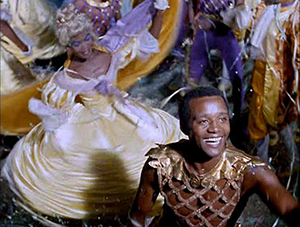Skin Temperature: Air Conditioning and Cross-Racial Identification in "Orfeu Negro" (1959)
Julia Walker, Associate Professor of English and Drama, Washington University in St. Louis
This paper investigates the effects of air conditioning on the aesthetic response of audiences in mid-twentieth-century theatres. With a focus on French director Marcel Camus’s film Orfeu Negro (Black Orpheus, 1959) and its basis in Brazilian poet Vinícius de Moraes’s play Orfeu da Conceição (1956), I demonstrate how these works made complicated aesthetic appeals to audiences who were beginning to experience what it meant to “be in one’s own skin” in a new way. Noting that theatres were among the first public buildings to feature air conditioning, I argue that this new technology paradoxically facilitated cross-racial identification by inviting white-identified audiences to project a subjective sense of self into a racialized “other” on stage or screen, while securing an ontological sense of self within the boundaries of their own air-cooled skin. Such an experience, I suggest, helped them rehearse the possibility of responding as an intersubjective “thou” to the “I” of Black liberationists throughout the postcolonial world.
Julia A. Walker holds a joint appointment in the English and Performing Arts Departments at Washington University in St. Louis. She is the author of Expressionism and Modernism in the American Theatre (Cambridge University Press, 2005), and is currently completing a book manuscript entitled Bodies of Knowledge: Performing Epistemology on the Modern Stage, from which this talk derives.



